Posts tagged "books":
Books of 2023
Even though I did read some fiction last year, non really stuck with me. It appears that I am more interested in non-fiction these days. Strange how these things go.
Quest for Performance
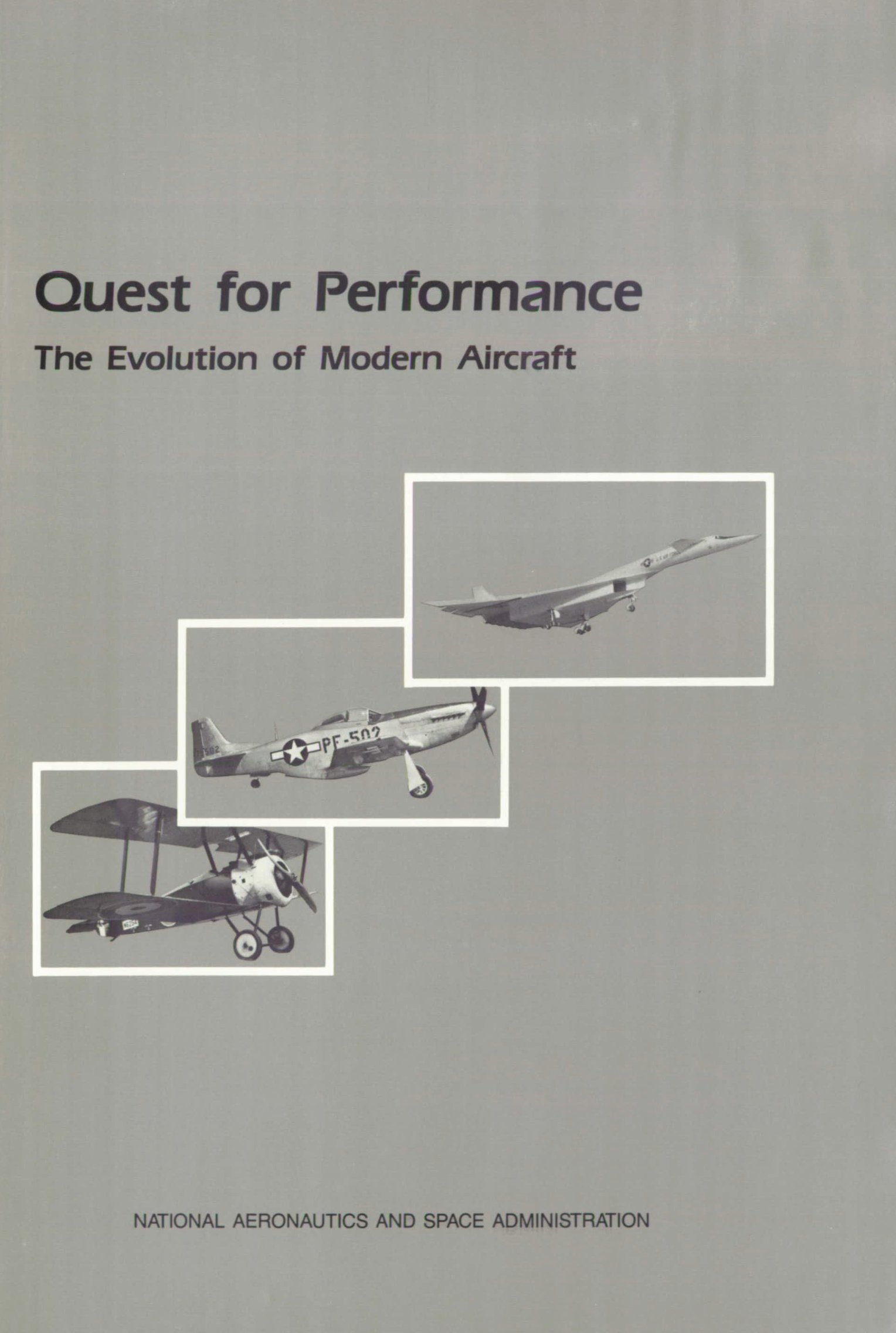
Quest for Performance: The Evolution of Modern Aircraft, by Laurence K. Loftin
I have searched for a book like this for a long time: a history of airplane technology. The book details technological milestones and archetypes from the Wright flyer to the mid-1980s, with an emphasis on the two world wars and interwar years. It sometimes veers too close to a mere list of models and performances, but by and large still manages to tie it all into a comprehensible narrative. I guess you need to be a bit of an airplane nerd to appreciate this, but I found it fascinating!
And it is free to download, too.
The Soul of a New Machine
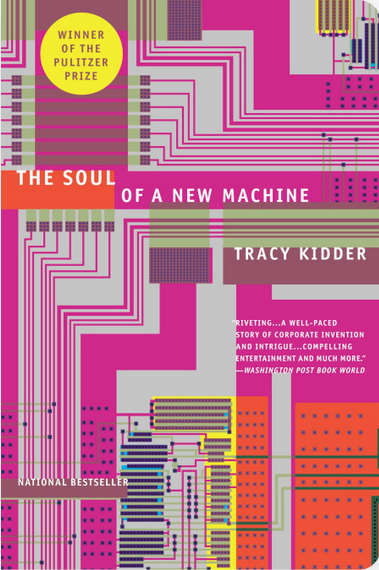
The Soul of a New Machine, by Tracy Kidder
The book retells the development of a computer during the interstitial years, after the big bang of computing in the first half of the century, but before the home computer revolution. This is a bit of a gap in the common computing lore, and one I hadn't know much about.
This happened before standardized CPU architectures, so we get a glimpse into CPU hardware design, the user-land software side of things, and the micro-code in between. This is quite an unusual perspective today, reliant on common abstractions as we are.
A fascinating read if you're interested in computing history, without requiring a Computer Science degree for the broader story.
Die großen Zeppeline
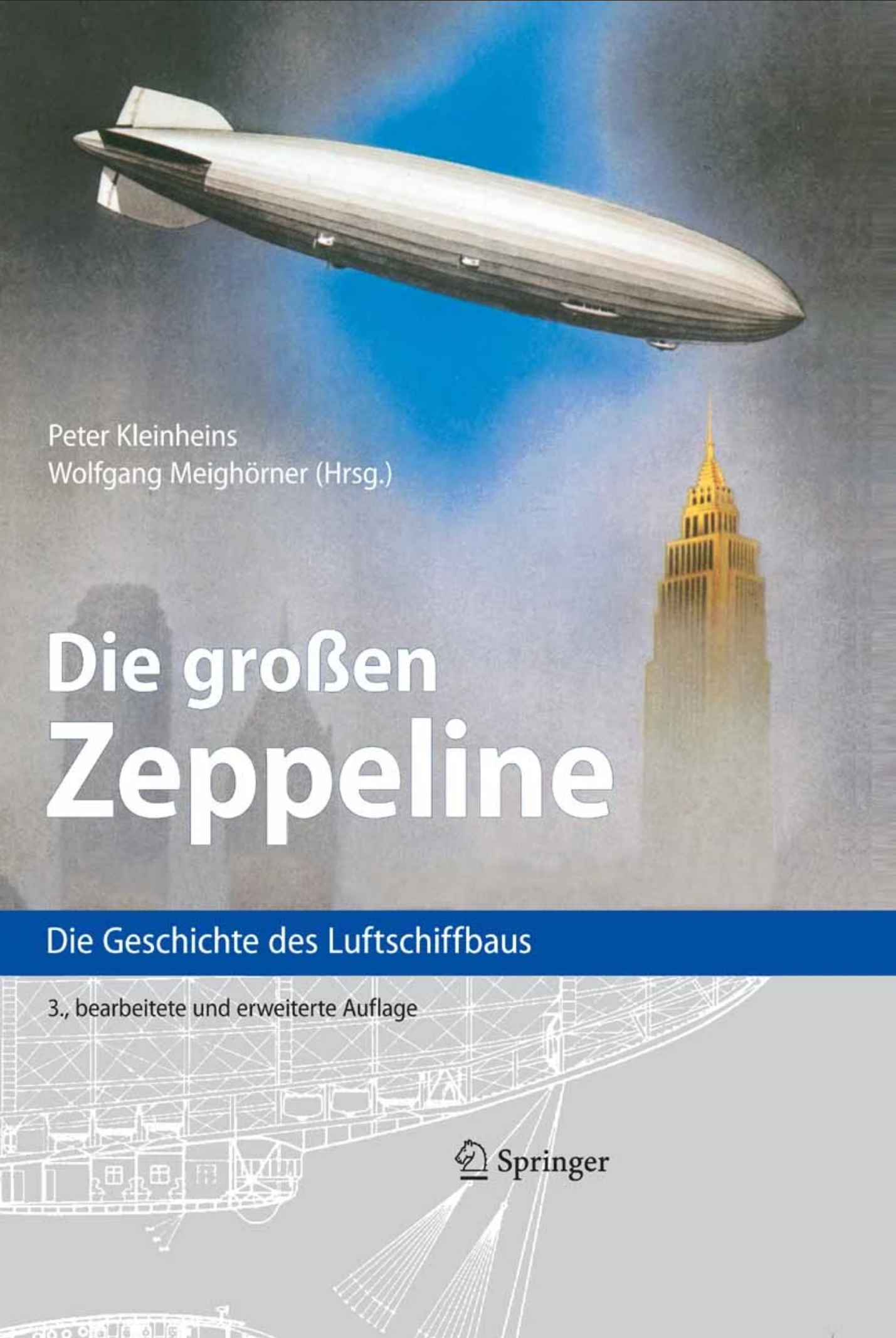
Die großen Zeppeline: Die Geschichte des Luftschiffbaus, by Peter Kleinheins
Half the book is reprints of technical reports of the original lead engineers who worked on the German Zeppelins. The other half is a retrospective view of Zeppelins in Germany and elsewhere.
There are myriad fascinating details about Zeppelin construction, like how their gas bags were made from animal intestines, or how they reclaimed water from engine exhaust to prevent losing weight while burning fuel. And it's especially fascinating to read about these things from people to whom this was the pinnacle of technology, and juxtapose our modern perspective.
This is another book I've been searching for many years. I found both this and Quest for Performance on Library Genesis, which is a terrific resource for researching books.
Media of 2022
Around this time of the year, I usually write a blog post about my favorite books of the last year. But this time, not enough of them really stood out. So instead, here's my favorite pieces of media I consumed in the last year:
Firepower
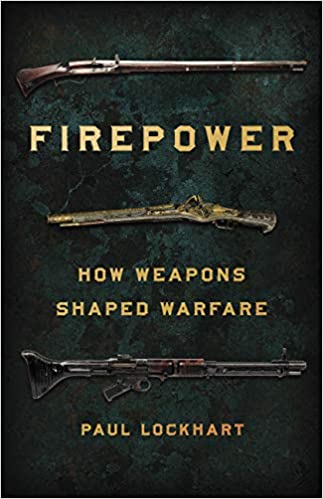
This is the story of how gunpowder changed the world. We get to see the familiar history of central Europe, but told unusually, from the bottom up: how seemingly small inventions change the course of peoples and nations. The book is in essence a history of warfare in the last few hundred years, but this time the movers and shakers are not Great Men, but chemistry and engineering. A fascinating perspective, to say the least.
Along the way, the book unraveled countless tangents and quirks I had previously stumbled upon, yet never understood. How castles went from tall walled structures to flat earthworks in the 18th century due to the disruptive invention of cannons. How wooden galleons of 1850 were obsoleted by turreted iron warships practically overnight. How rifling and shells bled dry the coffers of Central Europe and made conflict inevitable. This book contextualized many a story like this in the most riveting manner!
Steam Deck

Ever since we had our second child, I didn't really find the time for video games any more, much to my regret. So when the Steam Deck was announced, essentially a portable gaming computer, it didn't feel like a worthwhile investment.
But boy, was I wrong about that. The genius of the Steam Deck is how it's instantly-on, instantly-off like a video games console, allowing me to play in short bursts that would not otherwise be available to gaming. But in contrast to a console, the deck allows me to play games without blocking the living room, and away from the computer screen I'm working at all day anyway.
It has reignited my video gaming, and surprisingly not just for newer titles, but thanks to EmuDeck, emulated retro games as well. I had a blast playing Banjo-Kazooie with my daughter, and Chorus, Ace Combat, Guardians of the Galaxy and Death Stranding on my own. To me, this is a revolutionary device, and I haven't touched my gaming PC or any of my video game consoles since!
Books of 2021
Hologrammatica
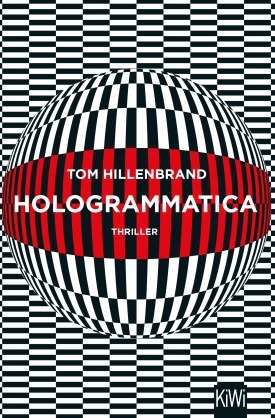
In the last years, I have almost exclusively read books in English. Science fiction, in particular, seems to happen exclusively in English (and perhaps Chinese). So much so, that I have come to associate German only with bad translations and personal communications, whereas English was the language of science, engineering, and fiction. In 2021 however, to my surprise, I stumbled upon Tom Hillenbrand's Hologrammatica, an science fiction thriller in German. It was a peculiar experience, reading the familiar tropes of the genre in a different language. Somehow it made the story feel more immediate and approachable to me. Strange, what effect language can have.
In the book, humanity has decided to hide reality behind holograms. Clothes and hairstyles can be altered on the fly, street lighting is replaced with projected advertisements. The twist is that in this semi-dystopian world, everyone knows that the holograms hide the truth, which is a collapsed society and dilapidated infrastructure. It is a smart, very current backdrop for a detective story with mind uploads, space elevators, and all the modern trappings of science fiction. A thoroughly enjoyable read!
Sci-Fi honorable mentions: Andy Weir's pop sci-fi Project Hail Mary and Martha Well's first novel-length murderbot entry Fugitive Telemetry.
Not Much of an Engineer

I have always been fascinated with aviation, and the technology of warfare. But most of the non-fiction I have read about these topics focuses on the stories of pilots and companies and soldiers, not engineers. In these stories some of the most important plot points came from advances in technology, yet they didn't describe how those changes came about. In 2021, I finally found a good history of aviation technology: Sir Stanley Hooker's Not Much of an Engineer describes the work of the author as the principal engineer at Bristol and Rolls-Royce from the Merlin-era second world war engines to modern turbofans. I guess you need to be a bit of an aviation/engineering geek to enjoy this, but to me this book was an important missing link that I had always looked for.
Non-fiction honorable mentions: David Goodsell's The Machinery of Life wonderfully illustrates the inner workings of cells.
Crafting Interpreters
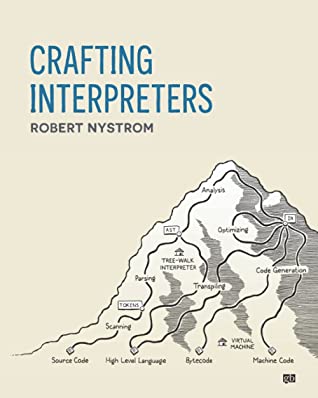
How do computers work? This question is surprisingly hard to answer. For me, the answer came in three books: Charles Petzold's Code: The Hidden Language of Computer Hardware and Software explained to me how processors work. The Arpaci-Dusseau's Operating Systems: Three Easy Pieces describes the infrastructure of operating systems that make processors and storage and network available to programs. And now, finally, Robert Nystrom's Crafting Interpreters filled in the last step, how a programming language is built.
The book describes two implementations of a simple programming language. The first one is a high-level introductory scripting language implemented in Java, the second a high-performance reimplementation in C. Fascinatingly, the entire source code for these implementations is included in the book's text, such that you can entirely follow along (or program along) and have a working programming language at all times. A truly eye-opening glimpse into the innards of the tools we are using every day. The book requires familiarity with Java and C to enjoy.
Books of 2020
Chickenhawk
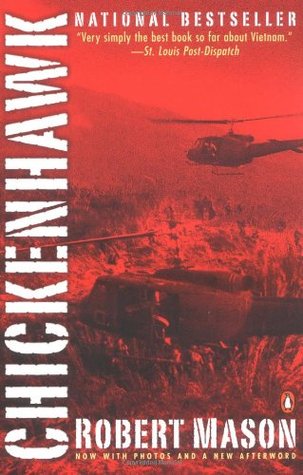
Most first hand accounts of wars I have read are written by a somewhat amateur author. Not this one. Robert Mason infused his terrifying tale with plenty of drama and humanity, and managed to write one of the best personal military history I have ever read.
Part of it is surely the subject matter, as I am a huge fan of aviation and its lore. And part of it is that I haven't yet read a lot about the Vietnam War.
But either way, I could not put this book down. Every mission seems to be more dramatic than the last, and you can see Mason's flying and survival skills just barely keeping up with the challenge. You can also viscerally feel the surviver bias at work, with plenty of close calls and dead friends. It's terrifying and thrilling at the same time.
And towards the end, the book truly surprised me with a very frank account of PTSD and the life of a veteran, which I hadn't read anywhere else in this level of clarity.
I cannot recommend this book enough. Perhaps a bit depressing at times, but an utterly compelling story, and without a doubt one of the best books I have ever read.
Mountain Light
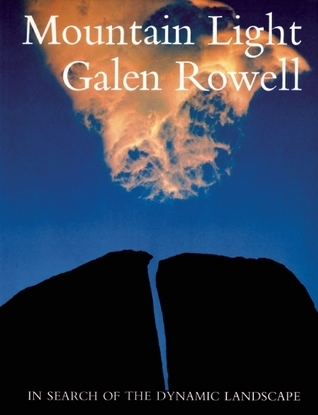
Quite simply, the best photography book I have ever read. From the era of color film, that short time between the black-and-white darkroom and photoshop, where pictures really couldn't be edited. It all came down to the skill of the photographer, which makes a book from this era much more useful than its darkroom-edited predecessors or photoshopped successors.
Besides that, the story of an avid adventurer who took part in several expeditions to climb the most difficult mountains in the world for the first time, and document life in the most remote places on earth before man could ever touch them.
All in all, a fantastic book of outdoorsmanship, adventures, and photography, three things I love dearly.
Two Years Before the Mast

The story of the young author joining a trader ship to the US west coast, in 1834, when it was still largely uninhabited and wilderness. They traveled to many a well-known place, such as San Francisco or Santa Barbara, but these places were still merely trading outposts and missions.
At the same time, the author chronicles a sailor's life on board the last generation of sailing vessels, just before they were replaced by steamers. He joined the ship on a two-year-or-so contract around the American continent, on an entirely self-sufficient ship with only the occasional sighting of a fellow ship or the lighting of cargo in a trading depot. Which is an utterly fascinating historical perspective considering that the story happens more-or-less at the same time as the comparatively modern-seeming Sherlock Holmes.
But a true eye-opener happens at the very end, where the author re-visits San Francisco later in his life. The city by then has grown to a bustling trade town with regular ferry routes and rail connections, churches and pubs, and all the amenities of modern life. It is hard to believe how such industry would grow from these humble beginnings in just a few decades.
Bobiverse: We Are Legion / For We Are Many / All These Worlds
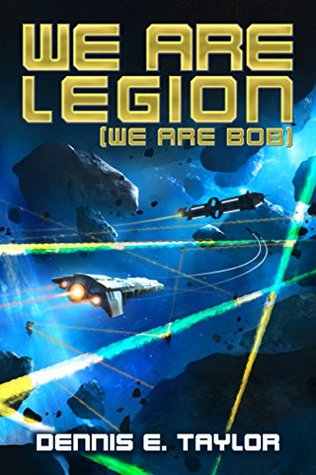
Like good candy, I just couldn't stop reading. The story of a regular guy, uploaded into a colony ship as an AI, roaming the galaxy, and exploring the boundaries of what it means to be human. Which sounds much more philosophical than it actually is. The book is written in a lighthearted and fast-paced style that I could hardly put down. I read the first book in one week, and immediately followed through with book two and three.
And it actually comes to a satisfying end in the third book, instead of methastesizing into a franchise, which I can't praise highly enough. Perhaps a little bit superficial and handwavy at times, but a thoroughly good time for a science fiction fan.
Books of 2019
Sapiens

More than any other book this year, Sapiens changed my view of the world. Or at least that's what it felt like while reading. It seemed as if every page contained a new and mind-blowing shift in perspective, such as casting money, democracy, and capitalism as "religions", and questioning the value of civilization in terms of individual human experience. My mind was reeling from the implications of these viewpoints, in a very good way.
On the other hand, my memory of the book is marred by the author's second book, Homo Deus, which highlights just how little the author's knowledge of history is worth when extrapolating into the future. It is, essentially, boring and shallow science fiction, with seemingly no knowledge decades of previous writing on the topic.
Come to think about it, this might reveal more about me than the author, for my own expertise is clearly more in science fiction than history; I might simply be much easier to please in the latter than in the former.
The Boat Who Wouldn't Float

This is the partly-fictional account of the author, Mowat Farley, and his boat. That leeks. And stinks. And doesn't sail well. And that is still entirely endearing.
Or maybe it is really about the humor with which the author recounts his misadventures on the Canadian shore. I stuck with this book even though my terrible digital library loaner had whole corrupted pages every chapter or two. But I could neither put it down, nor stop laughing. This might be the funniest book I have read in a decade. I must read more Mowat Farley!
Ninefox Gambit / Raven Stratagem / Revenant Gun
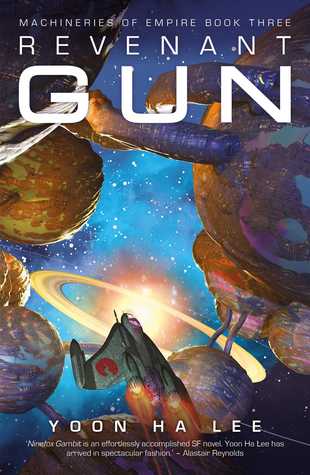
I did not like the first book in this series. It had a certain spark, but there was so much jargon and confusion, I just couldn't keep up. Yet. I kept coming back to it. That spark.
And in 2019, I bit the bullet, and picked up the sequel. And as with many things in life, it was better the second time around. Even though I still didn't quite get this particular sciency-fantasy-space-opera thing; I now felt at home in it, and could enjoy the story unraveling before me. At which point I couldn't put it down any longer. The two weeks I had to wait after finishing the second book before the third one released were harrowing. A masterpiece!
The Murderbot Diaries
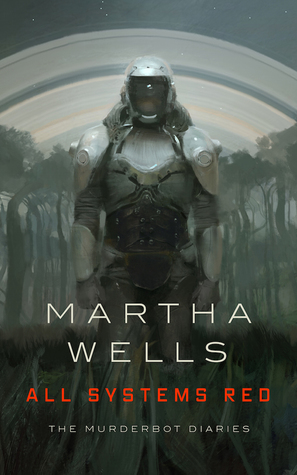
Sometimes I don't want to think. Sometimes I like a simple bit of escapism, like chocolate. Sometimes, I need to read about the Murderbot.
I love how the Murderbot Diaries cast humanity as uncaring and somewhat dim animals, with the most humane characters invariably being artificial intelligences. And the character of Murderbot itself is just so plain delightful, how it simultaneously wants to get away from, yet deeply cares for, us silly, childish humans.
Brains vs. Bullets
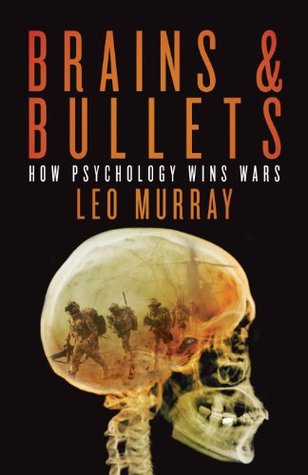
This is an odd one. It's about soldiers, and how they fight. Or rather, what keeps them from fighting. Because every one has a breaking point, and soldiers are often quite close to it when they fight.
And as it turns out, humans are by and large pretty bad at killing each other. Even professional soldiers apparently are often unable to do so, despite years of training and propaganda. Which is a heartening message indeed, for a book on warfare.
Books of 2018
There is no other media more immersive to me than reading. When I read, I dive deep into another world, and seize to perceive the reality around me. It is my escape from the everyday stresses of living in the modern world. Reading is truly sacred to me. So here are my favorite pieces of writing of 2018:
Shadow Divers

This is a book about deep wreck diving. I am not interested in wrecks, or diving. Nevertheless, no book gripped me as hard last year as Shadow Divers. At first, I was a bit thrown off by the writing style, and thought it dramatized things too much. But I just couldn't put this book down. There were times when I surfaced from reading with a distinct feeling of having been there, of having touched that menacing shipwreck at the bottom of the ocean.
By the end of it, I was entirely engrossed in the story and its characters and the history of the mystery wreck. And then, in the epilogue, I learned that what I had thought embellished at first was actually meticulously researched and not overdramatic at all.
And best of all, my favorite podcast, Omega Tau had an interview with the main protagonist of the book, which is just fascinating!
The Shortest History of Germany

This book is a strange choice to put on my list of books, because I didn't like it too much. I found it offputting which parts of history the author emphasized, and which parts he skipped. Apparently, the two world wars did not bear mentioning. The book paints a strangely specific west-vs-east map of Germany, which is not without merit, but surely not the whole story. And worst of all, I really didn't care for the writing style at all.
But when I look back on 2018, this book has stuck with me. Never mind its shortcomings, it has given me a map of Germany's history that I can fit other pieces of knowledge into. And that makes it valuable to me.
And then there were (N-One)
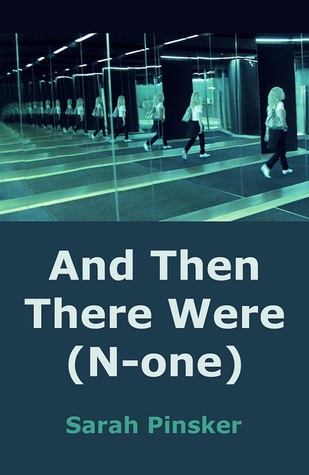
I love short stories. And this one is just brilliant. It is by Sarah Pinsker, about Sarah Pinsker, and all Sarah Pinskers from neighboring parallel universes. Every character in this book is a Sarah Pinsker. And all of them agree, Sarah is no murderer. Yet, one of them has been found murdered.
I won't spoil more of it, just head over to the Uncanny Magazine and read it for yourself!
Graphic Novels
For years now, I have struggled to find graphic novels that speak to me. I usually find the drawing style off-putting, and would have preferred a more fleshed out novel instead of a shallow graphic novel. But this year, I found two brilliant graphic novels that I loved dearly:
Maus

The half-auto-biographical narrative of a survivor of one the Nazi concentration camps. The novel juxtaposes the author's struggle to interview his father about his past, and thereby shows both the cruelty of the father's experience, and the man that this experience created. Both of these perspectives add weight to the unspeakable nastiness of the Holocaust.
But beyond that, it is also a story of humanity, struggle, and the small moments of joy amidst all the terror. Truly a masterpiece of a book.
Nimona

In sharp contrast to the previous book, Nimona is just plain fun! Nimona is a teenage girl, and a shark, and the sidekick of Balister Blackheart, the biggest name in Supervillainy. And if you haven't guessed it from this description, it is wacky, and funny, and uplifting, and just… fun!
You can read the first three chapters online, and then you'll want to read the rest, too. It's just too much fun!
Books of 2017
In late 2016, I took a short ferry flight to a small island in the area, and rekindled my love for aviation. Shortly afterwards, I started training for a pilot's license, and reading about aviation. From a literary perspective, aviation exists in the perfect goldilocks time frame of being just old enough to be thoroughly romanticized, but young enough for first-hand reports and thorough documentation to be available. What is more, powered flight has provided human observers with an unprecedented view of our world and our struggles, and is often as philosophical as it is exhilarating.
Aviation Reading List
Out of a long list of fascinating books on aviation I have read over the last two years, my favorites are:

- Fate is the Hunter by Ernest K. Gann, a gripping memoir of the early days of aviation. It has been only a little more than a hundred years since humans first took to the skies in Kitty Hawk in 1905, yet today aviation feels as mundane as horse-drawn carriages must have felt to the Wright Brothers. Gann lived through these early days, and tells his tales from a time when aviation was still young, dangerous, and perhaps more interesting. If you want to read more like this, Flight of Passage by Rinker Buck, and The Spirit of St. Louis by Charles Lindbergh are easy recommendations as well.

- Carrying the Fire by Michael Collins, one of the few first-hand accounts of an Apollo astronaut's voyage to the Moon. Most astronauts have published books later on, but most had them ghost-written, and none are as visceral and engaging as Michael Collins' journey on Apollo 8. It is humbling that Apollo's achievements have not been surpassed, despite our much more advanced technology and science. Other accounts worth reading are The Last Man on the Moon by Gene Cernan on Apollo 17, and How Apollo Flew to the Moon by W. David Woods, for a more technical view.

- Skyfaring by Mark Vanhoenacker is a more modern, and more philosophical account of how aviation has changed our perception of the world. If you yearn to fly like I do, then this book is a balm for the soul. The almost spiritual feeling of cutting your bonds with the ground is what this book is about, despite being written in today's un-romantic days of routine commercial airliners. I love it dearly. A more grounded account of aviation's history is Turbulent Skies by T. A. Heppenheimer, and maybe Slide Rule by Nevil Chute for some history on airships.
Fiction Reading List
But as much as I love aviation, my first love is still Science Fiction. We live in strange times of unprecedented prosperity, and yet we are strangely unsatisfied, as if the future didn't turn out to be the utopia it was meant to be. Or is this just a reflection of ourselves, how we do not live up to the future we built?

- A Closed and Common Orbit by Becky Chambers describes a more distant future, when space travel is as mundane as airliners are today, and humanity is just one of several alien species. Yet, with all its technological marvels, we still yearn for meaning and love, regardless of what strange world we live in. A Closed and Common Orbit is the second book in the series, and the first book I read. I think I prefer it in this order.

- The Laundry Files Series by Charles Stross is closer to home. Did you ever notice how computer programming is eerily similar to the arcane incantations we use to describe magic in fiction? Where is the difference between invoking a function that effects a robot, and invoking a magic spell that affects a demon? According to Charles Stross, this difference is really only playing with semantics, and we should be very careful with our incantations, lest the ghost in the machine really does have our demise in mind. These books have made me laugh out loud so many times, like when a weaponized PowerPoint turned people into zombies, or when a structured cabling project turned out to create an inadvertent summoning grid for an elder horror.
Books of 2015
Among Others, by Jo Walton
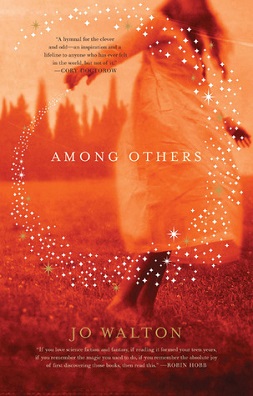 I don't usually enjoy fantasy novels and their romantic escapism. I much prefer fascinating sci-fi thought experiments. But this book won all the most important awards, so I gave it a shot. What if random chance could be bent a little with creativity, the power of believing in something, and some mysticism? You end up with a world that is richer, more meaningful, and altogether more alive, if you just cared to observe and to appreciate it's beauty. Reading this book left me enchanted and more observant long after I put it down. What a wonderful book!
I don't usually enjoy fantasy novels and their romantic escapism. I much prefer fascinating sci-fi thought experiments. But this book won all the most important awards, so I gave it a shot. What if random chance could be bent a little with creativity, the power of believing in something, and some mysticism? You end up with a world that is richer, more meaningful, and altogether more alive, if you just cared to observe and to appreciate it's beauty. Reading this book left me enchanted and more observant long after I put it down. What a wonderful book!
A Son of the Circus, by John Irving
This is one of those books that was on my to-read list for months. It starts out as quirky and likeable as you would expect from John Irving. This time, we follow the tale of a Canadian/Indian doctor throughout his life, and his summer vacation in India. But this would not be John Irving if there weren't plenty of colourful characters, astute observations of human strangeness, and a meticulously crafted story. There is no scene in this book that does not serve a purpose, and so many moving parts my mind just boggles at the construction of it all. Yet at the same time, I was regularly laughing out loud. I loved every minute of this!
The Windup Girl, by Paolo Bacigalupi
 The whole world changed in the near future, when gasoline is a rare luxury, sea levels have risen and swallowed all the coastal cities, and man-made scourges have devastated most crops. And now it's not just humans that populate our urbanized world, but so too are our inventions, artificial humans called "windups" for their stutter-stop movements. But at the core, both humans and windups struggle for the same security, prosperity as ever. Such an inventive world, so much vivid creativity, social commentary, in this human struggle to not destroy ourselves.
The whole world changed in the near future, when gasoline is a rare luxury, sea levels have risen and swallowed all the coastal cities, and man-made scourges have devastated most crops. And now it's not just humans that populate our urbanized world, but so too are our inventions, artificial humans called "windups" for their stutter-stop movements. But at the core, both humans and windups struggle for the same security, prosperity as ever. Such an inventive world, so much vivid creativity, social commentary, in this human struggle to not destroy ourselves.
Zen and the art of motorcycle maintenance, by Robert Pirsig
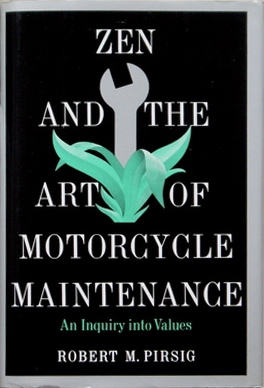 This is about equal parts a motorcycle journey of a father and his son across the US, and a dive into another man's discoveries of philosophy. To be honest, I liked this book more for it's character descriptions and travelling adventures than it's philosophy. I am really conflicted about putting this book on this list at all, but I kept thinking about this long after I finished reading it, so I guess this had a bigger influence on me than I realized.
This is about equal parts a motorcycle journey of a father and his son across the US, and a dive into another man's discoveries of philosophy. To be honest, I liked this book more for it's character descriptions and travelling adventures than it's philosophy. I am really conflicted about putting this book on this list at all, but I kept thinking about this long after I finished reading it, so I guess this had a bigger influence on me than I realized.
Nexus/Crux/Apex, Rad/Blue/Green Mars, The Martian, The Three-Body Problem
What happens when you take today's world, and add nanotech brain upgrades (Nexus/Crux/Apex), or strand a lone scientist on Mars (The Martian), or send a large number of people to found a new colony on Mars (Red/Blue/Green Mars), or suddenly make contact with Aliens (The Three-Body Problem)? This what-if is what Science Fiction does best: Take this little what-if, and spin a gripping yarn from that. These books inspired me, made me think, were incredibly thrilling, but they did not have a lasting impact. Still well worth a read if you like Science Fiction, though.
Books of 2014
Ancillary Justice / Ancillary Sword, by Ann Leckie
 I have been reading a lot of science fiction in the last few years. These books are part one and two of the best space opera I have ever read. The story is written from the perspective of an AI, sometimes inhabiting a lot of bodies, sometimes only one. Interestingly, this makes for a very introspective viewpoint, where politics and actions are expressed as consequences of nuanced human behavior and astute observation, as opposed to arbitrary human decisions. This perspective is extremely compelling, and makes for an extremely human story in a world that is a clever amalgamation of ancient Roman society and post-modern egalitarianism. There is no book I look forward to more fiercely than the conclusion of this series.
I have been reading a lot of science fiction in the last few years. These books are part one and two of the best space opera I have ever read. The story is written from the perspective of an AI, sometimes inhabiting a lot of bodies, sometimes only one. Interestingly, this makes for a very introspective viewpoint, where politics and actions are expressed as consequences of nuanced human behavior and astute observation, as opposed to arbitrary human decisions. This perspective is extremely compelling, and makes for an extremely human story in a world that is a clever amalgamation of ancient Roman society and post-modern egalitarianism. There is no book I look forward to more fiercely than the conclusion of this series.
Scott Pilgrim, by Bryan Lee O'Malley
 Scott Pilgrim is a twenty-something in the nineties. Scott Pilgrim doesn't have a job, and likes to play video games. Scott Pilgrim is fighting epic Anime battles against his girlfriends' exes. Scott Pilgrim is everyone, living in the real world. Scott Pilgrim is awesome, especially the new color-versions. The last part of the series will be released next year, and I really can't wait! (There's also a movie that is supposedly very good, but I won't watch it until I read all the comic books).
Scott Pilgrim is a twenty-something in the nineties. Scott Pilgrim doesn't have a job, and likes to play video games. Scott Pilgrim is fighting epic Anime battles against his girlfriends' exes. Scott Pilgrim is everyone, living in the real world. Scott Pilgrim is awesome, especially the new color-versions. The last part of the series will be released next year, and I really can't wait! (There's also a movie that is supposedly very good, but I won't watch it until I read all the comic books).
Doomsday Book, by Connie Willis
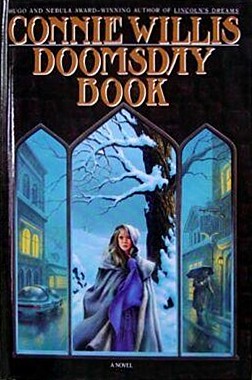 This is about time travel from near-future Britain to the fifteenth century. But then, an epidemic breaks loose: Britain is in quarantine and civil order starts breaking. At the same time in the fifteenth century, the plague hits. Disease, and the people trying to deal with it, is a human tragedy beyond belief. Connie Willis manages to write about these things with empathy, and astounding humane love and humor. This story moved me more deeply than I care to acknowledge.
This is about time travel from near-future Britain to the fifteenth century. But then, an epidemic breaks loose: Britain is in quarantine and civil order starts breaking. At the same time in the fifteenth century, the plague hits. Disease, and the people trying to deal with it, is a human tragedy beyond belief. Connie Willis manages to write about these things with empathy, and astounding humane love and humor. This story moved me more deeply than I care to acknowledge.
Snow Crash
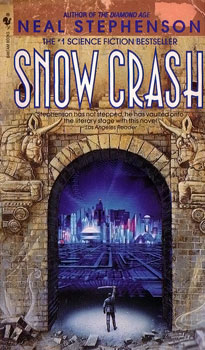
This is probably the one book that made me who I am. I bought this book in the English section of a Norwegian bookstore while on a bike trip there. I was just out of school and I had not decided yet what to do with my life. My English was just barely good enough to understand Snow Crash.
At its essence, Snow Crash introduced me to the idea of hacking. That is, hacking in the abstract sense of using knowledge about the inner workings of things to influence the world. At the time, I didn't know anything about software yet. Even though the main hero of the book is a master hacker and part of the book plays out in cyber space, it never really talks about the act of writing code. I would learn about that later.
Snow Crash was my red pill. Re-reading it today, after having been a professional software engineer for a few years, I can't overstate how influential this book has been in my life. It instilled in me the desire to understand the deep structures of things. And with that, the ability to influence and create the world around me. It set me on the path to becoming who I am today.
Snow Crash also served as my introduction to modern utopian cyberpunk. Even though I spent my youth playing video games and reading bad sci-fi, I still remember Snow Crash as my formal introduction to cyber space, virtual avatars, megacorporations, and light cycle races. And it told of the awesome power of reason.
If you haven't already, go read this book!
